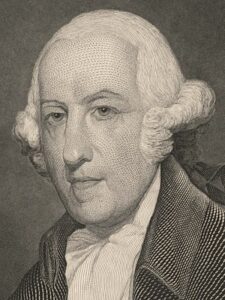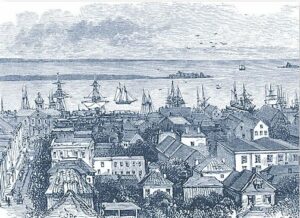Americanism Redux
March 16, on the journey to the American Founding, 250 years ago today, in 1773
Beneath a blanket of snow, a grave recently dug holds the body of a deceased elderly woman. She is Margaret-Christine Otis Baker of Dover, New Hampshire, 85 years old at the time of her death back in late February. Today, 250 years ago, her three-week old death is so significant that the people of Hartford, Connecticut are still reading about it in their newspaper, The Hartford Courant.
(a depiction of Margaret-Christine Otis Baker)
Her life seemed to belong to a different world of time. Her year of birth was 1688, around the so-called “Glorious Revolution” in England that finally ended nearly a half-century of bloodshed, disorder, and violence from the English Civil War. 1688 was the year when such political writers as John Locke, James Harrington, and Algernon Sidney were writing about liberty, freedom, and individual rights. Today, 250 years ago, these same writers are once again popular, some of the favorites among pro-colonial rights supporters who cite their ideas in books, essays, and speeches. 1688 continues.
Still, another part of Margaret-Christine’s life feels ancient, a thing of a vanished era. As a baby, in 1689, she was kidnapped by Native warriors from the Penacook tribe. They killed her older sister because, unlike the infant Margaret-Christine, she would have to be dragged, not carried, toward the Canadian woods. That Margaret-Christine could be hauled more easily was the only slim truth that kept her alive.
While in French Canada she was converted to Catholicism, became married as a teenager, and gave birth to two children. She lived a life vastly different from her New England beginnings. She escaped, married a Massachusetts man, and started a new family in Deerfield, Massachusetts. A French priest attempted to bring her back to Canada but the British royal governor in Massachusetts warned him off. Margaret-Christine gained fame in New England as the survivor of a traumatic ordeal in the culture of a distant land. It was the kind of story that attracted widespread attention for its mystery—people in New England wondered and worried about living among Native peoples and French Catholics. They noted that many captives often decided never to return to New England. Margaret-Christine was an exception.
But that doesn’t happen much anymore. Those stories had disappeared fifty, sixty, seventy years ago; hers was one of the last. Margaret-Christine’s experience belonged to a different period of time. It wasn’t modern. Life has changed.
Under a cover of white, the recent grave of an old woman told of continuity and change and the eternal connection between them. Within a few weeks, the early buds will appear on trees near the stone marker. The snow will recede as the mud returns. And where will your attention go—to the seasons that continue in cycle or the season that changes from the season before? To the application of writers and their ideas across the century prior or to the bygone mystery of a captured life? One continues and one changes.
Also
In New York City James Rivington advertises his new newspaper, the “Rivington’s New York Gazeteer, Or The Connecticut, New Jersey, Hudson’s River, and Quebec Weekly Advertiser.” Let’s call it the RNYGOTCNJHRAQWA, for short. Come to think of it, use “Rivington’s” as the title and leave it at that.
He’s pledging to be impartial and non-committed to any particular political side in the imperial-colonial rights disputes. He just wants to get information out to his readers. He states that he’ll write about business, science, production, mechanics, farming, oratory, literature, theater and whatever “may contribute to the Improvement, Information, and Entertainment of the Public.” Can he stand upon what he states? Only time will tell.
Down in South Carolina, the printer of Charleston’s newspaper includes a copy of Massachusetts Royal Governor Thomas Hutchison’s two-month old speech that lays out his case in opposition to the colonial rights movement. Intriguingly, on the same day, today, 250 years ago, the printer reports on the exchange of messages between South Carolina’s Royal Governor William Bull and its legislative assembly. It’s the opening of the legislative session for the next few weeks. Their mutual greetings—governor to assembly, and assembly to governor—are filled with courtesy, politeness, and professions of duty and public service. The Massachusetts and South Carolina political news are not printed side-by-side but they might as well be. You can’t mistake or avoid the notion of how long it could be before the reality of the Massachusetts colonial capitol will be the reality of the South Carolina colonial capitol. As with Rivington’s, only time will tell.
(Charleston, South Carolina)
For You Now
What do you choose or hope or prefer to continue?
What do you choose or hope or prefer to change?
And how do they interrelate, if they do so at all?
And beyond yourself, how do the continuities and changes of others fit with your own?
Margaret-Christine’s life pointed in both directions. The English political writers of her birth year remained vibrant and meaningful; they continued. Her captivity and removal into an unknown culture, once regarded by her birth culture as grotesque and bizarre, ceased to be so and was remarked upon as a memory, not as an ongoing condition; it changed.
The stories we’re seeing from the last half of 1772 and early 1773 are a mixture of change and continuity. Surrounding the mixture is an intensification of actions and decisions. The new and old twist together in revolving cycles. The pace is not what it once was—it has picked up speed.
Suggestion
Consider what you believe must continue and what must change.










